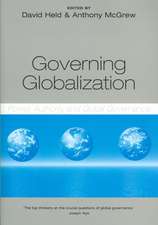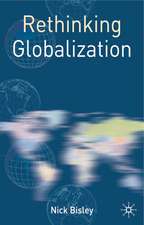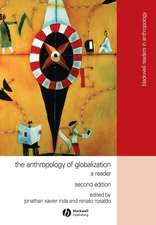Globalization – The Juggernaut of the 21st Century
Autor Jan-Erik Laneen Limba Engleză Hardback – 18 sep 2008
Preț: 501.04 lei
Preț vechi: 690.63 lei
-27% Nou
Puncte Express: 752
Preț estimativ în valută:
95.90€ • 104.21$ • 80.61£
95.90€ • 104.21$ • 80.61£
Carte tipărită la comandă
Livrare economică 22 aprilie-06 mai
Preluare comenzi: 021 569.72.76
Specificații
ISBN-13: 9780754673934
ISBN-10: 0754673936
Pagini: 282
Dimensiuni: 156 x 234 x 25 mm
Greutate: 0.68 kg
Ediția:1
Editura: Taylor & Francis
Colecția Routledge
Locul publicării:Oxford, United Kingdom
ISBN-10: 0754673936
Pagini: 282
Dimensiuni: 156 x 234 x 25 mm
Greutate: 0.68 kg
Ediția:1
Editura: Taylor & Francis
Colecția Routledge
Locul publicării:Oxford, United Kingdom
Recenzii
'For some globalization is positive, while for others it is largely negative. In this unusual and interesting book, Jan-Erik Lane supports the latter perspective. He focuses on the difficulties of controlling what he regards as the unstoppable momentum of Globalization and considers the prospects of an Open Global Society emerging as a result of the impact of the accelerating inter-connected challenges facing the human race. Using a rather unique approach, the author discusses the ideas of a wide range of historical and contemporary philosophical thinkers to throw new light on the multiple dimensions of Globalization. As such, this study provides a distinctive and useful contribution to the literature on this important subject.' John Baylis, Swansea University, Wales 'Comprehensive, thoughtful, provocative, depressing. Jan-Erik Lane has described a Juggernaut that none of us can escape, but all of us must ponder.' Ira Sharkansky, Hebrew University of Jerusalem, Israel 'This book is an outstanding contribution to the understanding of globalization. This very rich and original approach refers to the evolution of economic and social thought and to an extraordinary amount of most recent data showing that most challenges can be solved by adequate policy. Some are just the result of bad regulation and short-sighted business strategies.' Beat Bürgenmeier, University of Geneva, Switzerland 'Lane's perceptive study demonstrates the complexity of change and adaptation...It is a salutary reminder that the past has always to be contextualized before drawing lessons for the future.' Development and Change
Notă biografică
Jan-Erik Lane, University of Freiburg, Germany
Cuprins
Introduction The Challenges of Globalization, World Capitalism and the Global Open Society; Part 1 Rejecting the Cornucopian View; Chapter 1 Resilience is better than Anticipation: Wildavsky was both Right and Wrong; Chapter 2 The Energy-Environment Conundrum: Why Hubbert’s Pessimism is Grounded; Part 2 March of the Juggernaut; Chapter 3 World Capitalism and Unsustainable Lifestyles: Veblen is Still Relevant Today; Chapter 4 The Asian Miracle: Perhaps Lipset was Wrong about Affluence Producing Democracy, or Gerschenkron might have Predicted Correctly; Chapter 5 Globalization Ripping Poor States Apart: Why Hobbes may have been Just about Right; Part 3 Coordination Hopes; Chapter 6 Logic of International Coordination: The Wicksell Approach to Political Cooperation among States; Chapter 7 Balassa, Regional Organization and Economic Convergence in the EU Club of States; Chapter 8 Global Rule of Law? Kelsen was Contradictory about the Nature of Public International Law; Part 4 Fundamentalism and the Global Open Society; Chapter 9 Epistemology for a Global Open Society: Popper and Derrida Endorsing a Critical Society; Chapter 10 Human Values in the Global Open Society: Weber and Habermas on Respect for the Values Diversity; Chapter 11 The Problem of Religious Fundamentalism: Why No Spinoza in the Arab Culture Despite Averroes?; conclusion Conclusions;
Descriere
While some people debate whether globalization really exists, it proceeds apace, affecting all societies. This interesting and erudite book adopts a distinctive approach to the multiple dimensions of the globalization debate. The impressive coverage of philosophical thought - including Popper, Weber, Habermas, Lipset and Hobbes - makes a valuable contribution to the debates on globalization.
















